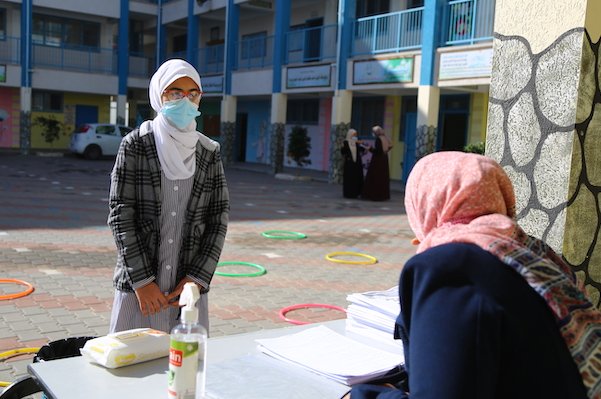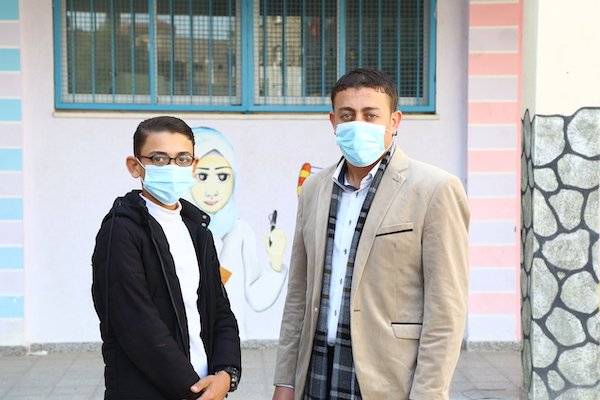Access to schools and learning has been disrupted all over the world during the COVID-19 pandemic. As schools have closed, around 1.5 billion children were sent home and had to rely on phones and computers to learn online if at all, meaning millions of children without access to devices to learn from home have missed out.
In the Gaza Strip — home to approximately 2 million people — the disruption to education caused by the pandemic has been just one of many devastating issues the area is facing. Already dealing with high levels of poverty, unemployment, and food insecurity, a grave escalation of conflict between Israel and Hamas in May worsened the humanitarian crisis and the disruption to people’s lives further still.
A total of 242 Palestinians, 66 of whom were children, were killed in bombing that took place between May 10 and May 21, while a further 1,948 people, including 670 children, were injured. Meanwhile, the learning of the nearly 600,000 school-age children in the Gaza Strip has been disrupted.
Despite the intense difficulties caused by the conflict and the COVID-19 crisis, school mental health counselors working in Gaza have kept working throughout — and are finding even more resourceful ways to keep in touch with the children they work with and deliver vital support.
Global Citizen spoke to two counselors, Imad Ahmad El Natour and Sabreen Tharef Mousa, who work for schools run by the United Nations Relief and Works Agency (UNRWA) and whose mental health service is supported by the international aid-funded Education Cannot Wait (ECW) agency, about how the trauma of recent events has affected children.
ECW is a global fund, supported by aid agencies, private donors, and philanthropists and was launched in 2016 specifically to ensure school-age children continue to get access to education during periods of crisis, such as during conflict or following natural disasters. In the Palestinian Territories of Gaza and the West Bank, ECW supports the capacity of schools and teachers, and is focused on supporting vulnerable children, girls, and children with disabilities.
Following the May crisis, the fund greenlit a new project in June to complement two other ongoing investments that support the COVID19 emergency response and access to quality education for Palestinian refugees in the Gaza Strip.
The project first made urgent repairs to schools damaged by the recent conflict and next will reach up to 105,500 children through recreational programs throughout the summer break that focus on mental health needs to alleviate stress and trauma and, in turn, prevent children dropping out of school.
“In regular times, my work is split into two parts, the main part is working with children at schools, providing one-to-one counseling, or sometimes group counseling, and the second is working with teachers and parents,” says El Natour.
“I do work in raising awareness of the importance of mental health support and helping parents find strategies to support their kids,” he continues. “We have a child-centred approach.”
Even in normal circumstances, before the pandemic and the escalated conflict, the job was difficult.

El Natour says, for example, that providing mental health services in the Gaza Strip to the community is sometimes a challenge because “there is a stigma that many people attach to mental health services, so it’s not an easy job for people doing counseling work to get people to accept support.”
However, he adds that attitudes are changing, partly thanks to the outreach done by him and his colleagues. “Now it’s much better because people themselves are reaching out to us more, seeking our services,” he says.
For his colleague, Sabreen Tharef Mousa, there is also an acute shortage of staff and it’s hard to recruit new mental health workers for that role. “For example a school might have 1,000 students, and one counselor, but that is too many students per counselor,” she says.
Both the counselors work within schools, and cases are referred to them by teachers or parents.
“The poverty they [children] face has a really negative impact on them first and foremost,” says Mousa, referring to the typical issues she comes across with her patients.
“The ability of their family to provide for them impacts their well-being. So you might find that, as a result of the pressures they are under, a child might be acting aggressively or experiencing low achievement at school and that’s when we might step in to work with a child,” she continues.
El Natour describes a recent case of a 7th grade pupil whose father was addicted to drugs and was being violently abusive to the child and their mother. “The mother was in a vulnerable position but she had contacted the school, without informing the child’s father, and the case was referred to me through her,” he explains.
“At school, I was able to offer support to the child,” he continues. “I also eventually spoke to the father and explained to him the problems he was creating for the child and provided support to the family to find better ways of dealing with what was happening. Now the father has attended a counseling session, and the situation has improved.”
However, during the COVID-19 pandemic El Natour has had to keep in touch with the family by phone only.
Both he and Mousaf have feared they would lose contact with children they work with.

“You can imagine how difficult my role is as a counselor during the pandemic,” says El Natour. “A big part of treating people is working with their feelings and emotions, so having to do that remotely is hard.”
Both internet access and consistent electricity supply is a major problem, he says. However UNRWA has given devices to some children who did not have them for home-learning and El Natour has also been given a work sim card to help with making phone calls to clients too.
According to UNRWA, children were given access to a self-learning program from April 2020, and they could attend an in-person 4-week catch-up in school last August.
“The recent conflict has disrupted the online home learning process, though.” says Mousa. “For example, we would see perhaps 30 students log in and do an online learning lesson but during the conflict time only five students or less in the class were connected with the lessons.”
Not to be deterred, both counselors say they have stepped up their own social media presence to make themselves more available to students and parents — answering questions over Facebook and in WhatsApp groups.
“I used to organize public awareness sessions with parents and teachers about life issues and how to help approach them, how to support your children in terms of their studies and general achievements in school, and so on,” says Mousa. “But right now I’m focusing on the pandemic and the recent conflict instead, giving out advice on social media about how to help solve or mitigate the problems surrounding these events.”
However, this innovative approach has seen their workload skyrocket as they answer messages day and night. “Absolutely, my work-life balance is certainly hard at the moment!” says El Natour.
Mousa agrees and says sometimes she finds herself answering messages any time in a 24 hour period. But she says with children facing so much, she and colleagues keep going.
“It’s shocking how much trauma students are now dealing with as a result of what’s happened,” she says. “Fear, grief, that kind of thing is something that requires counseling every day, and we are trying to stay connected.”
You can join the Global Citizen Live campaign to defeat poverty and defend the planet by taking action here, and become part of a movement powered by citizens around the world who are taking action together with governments, corporations, and philanthropists to make change.